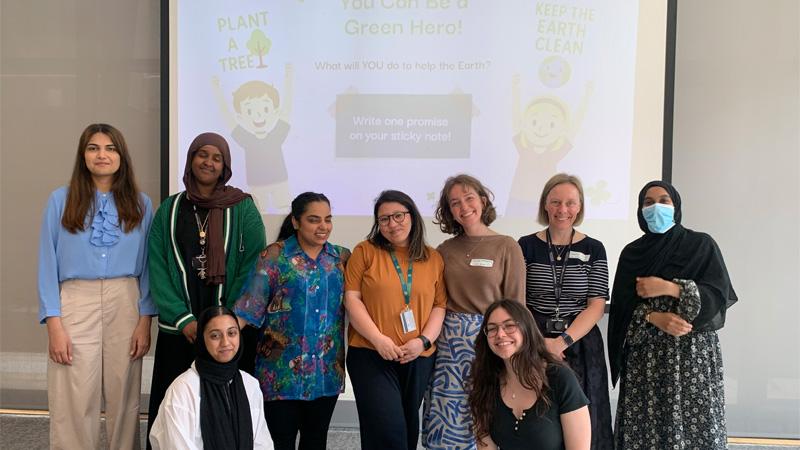The University of Westminster’s Cavendish Living Lab partnered with the Royal Society of Biology (RSB) to deliver a half-term sustainability workshop for families in the Westminster area. The session featured various activities to teach primary school pupils about sustainability concepts and environmental actions.

On 29 May, families from the local area visited Westminster’s Cavendish Campus for the Blue Planet, Green Future half-term sustainability workshop run by Greener Future Leaders from the University’s Quintin Hogg Trust-funded Cavendish Living Lab, in collaboration with the RSB. The two-hour interactive session aimed to promote biology and sustainability within the local community to children that are less likely to engage with higher education or Biology learning.
The workshop kicked off with a Green Buddy Match ice breaker game, where participants matched with others based on shared sustainable practices including recycling, walking or biking to school, using reusable water bottles and turning off the lights.
Westminster’s Greener Futures Leaders, who are supported by funding from the London Community Foundation Greener Futures Fund, then introduced the children to sustainability through an interactive presentation session. This featured entertaining videos covering the causes and effects of climate change and practical ways to help the environment including water conservation and composting.
Following the presentations, participants put what they learnt to practice through various workshops and activities. The first session was a hands-on water saving workshop, where small teams brainstormed and shared water conservation ideas using water droplet-shaped posters, markers and visual aids.

Participants then rotated between three activity stations to learn more about actions they can take to be environmentally friendly. Pupils learned the four essential composting components — nitrogen from green scraps, carbon from brown materials, moisture and oxygen — while building their own compost systems from plastic bottles, soil, organic materials and water. They also learned plant care instructions and planted sunflower and herb seeds in individual pots to take home, before selecting three to five seasonal and local fruits and vegetables for their plates while learning about how they can reduce environmental impact through food choices.
To conclude the session, parents and children worked together to commit to being more sustainable at home. Each participant wrote one sustainable action they promised to take from the workshop on a Green Promise Board.

About the workshop Dr Caroline Smith, Assistant Head of Westminster’s School of Life Sciences and Fellow of the Royal Society of Biology, said: "The workshop was made possible thanks to a Public Engagement Grant from the Royal Society of Biology. This funding allowed us to reach members of our local community who have had limited contact with higher education institutions, providing them with an opportunity to learn more about biology and sustainability."
Westminster second-year Biomedical Science BSc Honours student Julia Pinheiro Bassani commented: “Delivering the RSB Environmental Sustainability Workshop was an incredibly fulfilling experience. It was heartening to see parents and children learning side by side — sharing insights, planting seeds and making sustainable promises together. Integrating families in this way not only deepened the learning but also strengthened the sense of collective responsibility for our planet. Watching different generations connect over environmental action reminded me that sustainability isn't just about science, it's about community, continuity and care."
The workshop directly contributed to several of the United Nations Sustainable Development Goals (SDGs), including 4: Quality Education, 13: Climate Action and 17: Partnerships for the Goals. Since 2019, the University of Westminster has used the SDGs holistically to frame strategic decisions to help students and colleagues fulfil their potential and contribute to a more sustainable, equitable and healthier society.
Find out more about the Cavendish Living Lab at the University of Westminster.
To find out how to sponsor the Cavendish Living Lab, contact the University's Development Team.


